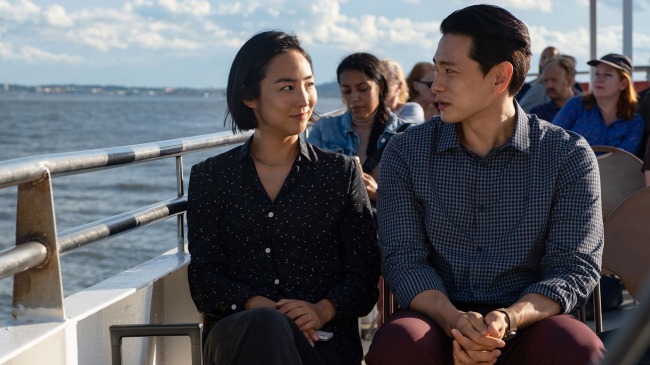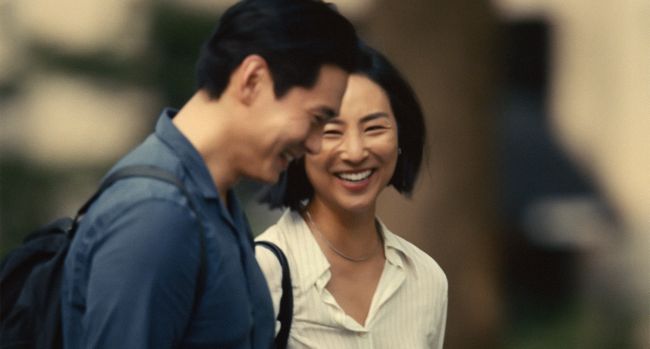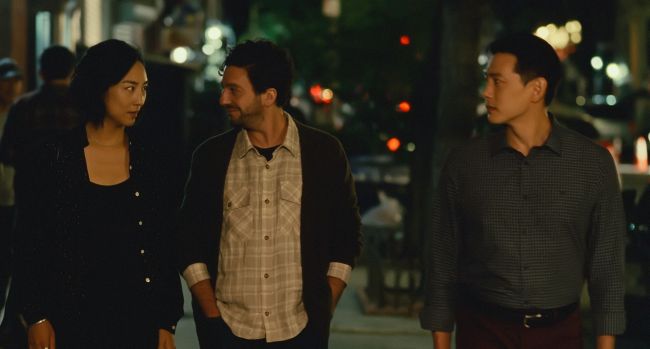Celine Song didn’t have any of the things that usually allow producers to trust a first-time filmmaker. In 2020, the New York Theater Workshop staged her play about the sea women of South Korea, “Endlings,” directed by Sammi Cannold; it received a mixed-to-positive New York Times review. However, there was no short film, no evidence of what Song herself might offer as a director. All she had, Song said, was her “seduction technique” — she believed that her script for “Past Lives” was so good that it would be the build-it-and-they-will-come of screenplays.
For so many indie filmmakers, that belief does not end well. In Song’s case, she was right.
“It’s the way that I could get collaborators to believe that I can do it,” she said over pre-strike drinks at the Culina Restaurant in Beverly Hills. “If you read the script, and you’re connected to it, then you could talk to me about how I planned on making it. Then, I think, amazing collaborators would be so ready to work with me on it. I don’t have a short to show you. I don’t have other ways, there’s no other proof of concept. It’s more like, ‘I know how to do this.’ Because of the script.”
Produced by Killer Films and David Hinojosa’s 2AM, who developed it with distributor A24, “Past Lives” was the hit of Sundance and Berlin 2023 and currently stands as the year’s best-reviewed film (Metascore: 96). A romantic-triangle drama starring “Russian Doll” breakout Greta Lee as Song’s alter ego, the story is inspired by a moment when Song found herself translating between her American husband (played in the film by John Magaro) and her Korean childhood soulmate (Korean star Teo Yoo in the feature). Killer principal Christine Vachon said that it didn’t matter that Song didn’t know films sets; she knew her story.

Greta Lee in “Past Lives”
“That’s what you’re looking for,” Vachon said on the phone. “Someone inexperienced who has not been on set before, we can show them how to read a call sheet or what a grip stand is. But if they don’t know the story they want to tell, I don’t know what to do. She really did. Once she understood the physical mechanics of how a movie gets made, she was off to the races.”
Song said that the heart of the story stemmed from a powerful memory. “It was me sitting there with my childhood sweetheart and my American husband and translating between the two of them,” Song said. “And first of all, how powerful I felt because I’m in control of time and space or of this amazing meeting of these two people in the universe with no business knowing each other. As we’re sitting there, because we were such a weird trio, I could see that in the bar, people are looking at us trying to figure out who we are to each other.”
Song realized, as she told friends the story, that “I should just write it,” she said. “At the time that I was writing it, I didn’t know that anybody was going to make it. And also anybody’s going to let me direct it, too.”
The playwright understood the difference between writing for stage and screen. “In theater, the actors are just there to create an entire world with only dialogue,” she said, “only the things that are spoken in the space. And I knew that in film, so many other things are there to be a fundamental part of storytelling. You’ve learned that you can tell the story as simply as the way that a person looks at somebody else.”
The story unfolds in three time periods, across two decades and two continents. In South Korea, pre-adolescent Moon Seung-ah and Hae Sun are close friends and academic competitors with romantic feelings — until Moon and her family take off to Toronto, where she changes her name to Nora. In their twenties, Hae Sun and Nora reconnect on the internet. The story is framed by the present 12 years later, when Hae Sun tracks down the married playwright Nora in New York. He needs to close the door that has been left open all these years. And when Nora meets him again, he embodies an alternate reality and a lost part of herself.
“We encounter these doors in our lives all the time,” said Song. “But they often go without being noted. Sometimes, these moments are like a portal into a new different reality or universe where you’re with someone else. What made sense to me to articulate in the movie is that feeling of seeing through the door, and then walking away, which is a feeling we all connect to. Just because the door is there, it doesn’t mean that you always walk through it. Sometimes it’s knowing the door is there and then to walk right past it.”
When Hae Sun flies 13 hours to see Nora, “he feels that the door is not closed inside of him,” she said. “And it’s not like when he sees through the door, he sees Nora as she has now grown up. He actually sees the door in his heart and he sees a little girl that he loved. So what he wants to do is to close that door by seeing Nora.”
Before Lee Isaac Chung’s “Minari” provided precedent, Song wrote the bilingual script using WriterDuet. Final Draft doesn’t support the Korean language.
“I wrote it in Korean first if it was in Korean and then I would write English translation underneath for every piece of dialogue,” she said. “It has to be read by the people who are going to make the movie with me because not all of them are going to speak Korean. But also it needed the actors who are going to speak Korean to know exactly what words are going to be used for it because, of course, a language has to be so specific.”

“Past Lives”Jon Pack
A24 gave Song the freedom to cast whoever she wanted, and Song wanted “a soul match from the actor to the character,” she said. “The story of the script has to be connected to what the actor is like. When I would meet an actor, it would be like, ‘is there a part of them that understands this in not just an intellectual way, but in the way they live?’ It’s a chemical thing. They’re a bunch of little marriages where you are going to love them, and accept them for all of their strengths and flaws.”
Somehow, Song intuited that she must keep Magaro and Yoo apart until their first on-camera meeting. “We were rolling when that happened,” she said. “So much of the movie is about first hellos. And then the last goodbye. So much of it’s about meeting and leaving each other that it felt important to do some tricks like that, so that the actors can have a little help with this particular extraordinary feeling.”

“Past Lives”
The key crew hire for Song was “Small Axe” cinematographer Shabier Kirchner. “His work was so undeniably amazing,” she said. “You always have to fall a little bit in love with that person who is going to create images with you, and complement you, and do things that I can’t do. He and I are so different. When he is calm, I’m anxious and when I’m calm, he’s anxious, so we can be there for each other in that way. The rhythm was shocking.”
When they prepared each scene, “he was always talking about the whole film,” she said. “And we were talking about character, we were talking about story. We weren’t just talking about the technical aspects of it. It was always going to be about, ‘It would be really cool if we did that shot, but does that actually speak to what the scene is?'”

Greta Lee, John Magaro, and Teo Yoo in “Past Lives”
Nobody asked Song to change a word of her script, but she learned that real-world forces can push on-set changes. “The rain sequence in the film, for example, used to be very different,” she said. “It was a little more comical and involved 10 locations. But then it became something that really highlights how lonely [Hae Sun] is, by sticking him at the hotel. Or like the scene in Madison Square Park, we thought we were gonna shoot it at MoMA. We ran into what it costs and what it is to try to shoot at MoMA.”
Next up: After the opening, we will run Song’s in-depth dissection of the film’s extraordinary one-take final sequence. She’s already written another screenplay, about which she is keeping mum.
A24 will release “Past Lives” in theaters on Friday, June 2.
For so many indie filmmakers, that belief does not end well. In Song’s case, she was right.
“It’s the way that I could get collaborators to believe that I can do it,” she said over pre-strike drinks at the Culina Restaurant in Beverly Hills. “If you read the script, and you’re connected to it, then you could talk to me about how I planned on making it. Then, I think, amazing collaborators would be so ready to work with me on it. I don’t have a short to show you. I don’t have other ways, there’s no other proof of concept. It’s more like, ‘I know how to do this.’ Because of the script.”
Produced by Killer Films and David Hinojosa’s 2AM, who developed it with distributor A24, “Past Lives” was the hit of Sundance and Berlin 2023 and currently stands as the year’s best-reviewed film (Metascore: 96). A romantic-triangle drama starring “Russian Doll” breakout Greta Lee as Song’s alter ego, the story is inspired by a moment when Song found herself translating between her American husband (played in the film by John Magaro) and her Korean childhood soulmate (Korean star Teo Yoo in the feature). Killer principal Christine Vachon said that it didn’t matter that Song didn’t know films sets; she knew her story.

Greta Lee in “Past Lives”
“That’s what you’re looking for,” Vachon said on the phone. “Someone inexperienced who has not been on set before, we can show them how to read a call sheet or what a grip stand is. But if they don’t know the story they want to tell, I don’t know what to do. She really did. Once she understood the physical mechanics of how a movie gets made, she was off to the races.”
Song said that the heart of the story stemmed from a powerful memory. “It was me sitting there with my childhood sweetheart and my American husband and translating between the two of them,” Song said. “And first of all, how powerful I felt because I’m in control of time and space or of this amazing meeting of these two people in the universe with no business knowing each other. As we’re sitting there, because we were such a weird trio, I could see that in the bar, people are looking at us trying to figure out who we are to each other.”
Song realized, as she told friends the story, that “I should just write it,” she said. “At the time that I was writing it, I didn’t know that anybody was going to make it. And also anybody’s going to let me direct it, too.”
The playwright understood the difference between writing for stage and screen. “In theater, the actors are just there to create an entire world with only dialogue,” she said, “only the things that are spoken in the space. And I knew that in film, so many other things are there to be a fundamental part of storytelling. You’ve learned that you can tell the story as simply as the way that a person looks at somebody else.”
The story unfolds in three time periods, across two decades and two continents. In South Korea, pre-adolescent Moon Seung-ah and Hae Sun are close friends and academic competitors with romantic feelings — until Moon and her family take off to Toronto, where she changes her name to Nora. In their twenties, Hae Sun and Nora reconnect on the internet. The story is framed by the present 12 years later, when Hae Sun tracks down the married playwright Nora in New York. He needs to close the door that has been left open all these years. And when Nora meets him again, he embodies an alternate reality and a lost part of herself.
“We encounter these doors in our lives all the time,” said Song. “But they often go without being noted. Sometimes, these moments are like a portal into a new different reality or universe where you’re with someone else. What made sense to me to articulate in the movie is that feeling of seeing through the door, and then walking away, which is a feeling we all connect to. Just because the door is there, it doesn’t mean that you always walk through it. Sometimes it’s knowing the door is there and then to walk right past it.”
When Hae Sun flies 13 hours to see Nora, “he feels that the door is not closed inside of him,” she said. “And it’s not like when he sees through the door, he sees Nora as she has now grown up. He actually sees the door in his heart and he sees a little girl that he loved. So what he wants to do is to close that door by seeing Nora.”
Before Lee Isaac Chung’s “Minari” provided precedent, Song wrote the bilingual script using WriterDuet. Final Draft doesn’t support the Korean language.
“I wrote it in Korean first if it was in Korean and then I would write English translation underneath for every piece of dialogue,” she said. “It has to be read by the people who are going to make the movie with me because not all of them are going to speak Korean. But also it needed the actors who are going to speak Korean to know exactly what words are going to be used for it because, of course, a language has to be so specific.”

“Past Lives”Jon Pack
A24 gave Song the freedom to cast whoever she wanted, and Song wanted “a soul match from the actor to the character,” she said. “The story of the script has to be connected to what the actor is like. When I would meet an actor, it would be like, ‘is there a part of them that understands this in not just an intellectual way, but in the way they live?’ It’s a chemical thing. They’re a bunch of little marriages where you are going to love them, and accept them for all of their strengths and flaws.”
Somehow, Song intuited that she must keep Magaro and Yoo apart until their first on-camera meeting. “We were rolling when that happened,” she said. “So much of the movie is about first hellos. And then the last goodbye. So much of it’s about meeting and leaving each other that it felt important to do some tricks like that, so that the actors can have a little help with this particular extraordinary feeling.”

“Past Lives”
The key crew hire for Song was “Small Axe” cinematographer Shabier Kirchner. “His work was so undeniably amazing,” she said. “You always have to fall a little bit in love with that person who is going to create images with you, and complement you, and do things that I can’t do. He and I are so different. When he is calm, I’m anxious and when I’m calm, he’s anxious, so we can be there for each other in that way. The rhythm was shocking.”
When they prepared each scene, “he was always talking about the whole film,” she said. “And we were talking about character, we were talking about story. We weren’t just talking about the technical aspects of it. It was always going to be about, ‘It would be really cool if we did that shot, but does that actually speak to what the scene is?'”

Greta Lee, John Magaro, and Teo Yoo in “Past Lives”
Nobody asked Song to change a word of her script, but she learned that real-world forces can push on-set changes. “The rain sequence in the film, for example, used to be very different,” she said. “It was a little more comical and involved 10 locations. But then it became something that really highlights how lonely [Hae Sun] is, by sticking him at the hotel. Or like the scene in Madison Square Park, we thought we were gonna shoot it at MoMA. We ran into what it costs and what it is to try to shoot at MoMA.”
Next up: After the opening, we will run Song’s in-depth dissection of the film’s extraordinary one-take final sequence. She’s already written another screenplay, about which she is keeping mum.
A24 will release “Past Lives” in theaters on Friday, June 2.


